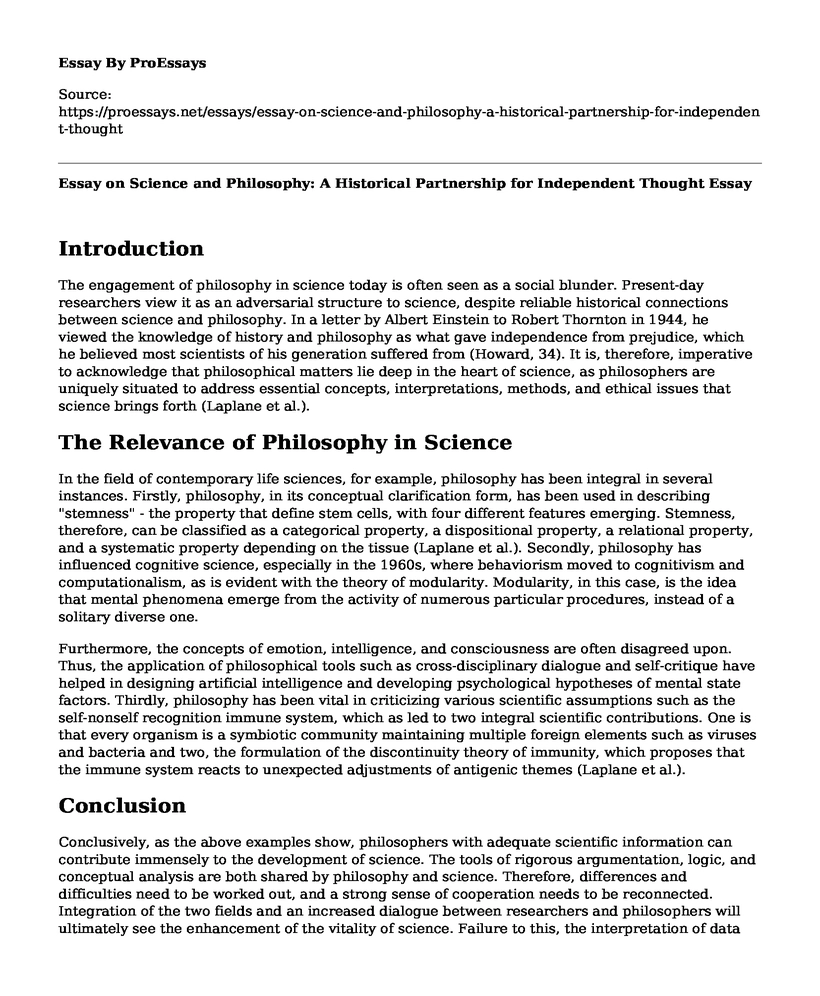Introduction
The engagement of philosophy in science today is often seen as a social blunder. Present-day researchers view it as an adversarial structure to science, despite reliable historical connections between science and philosophy. In a letter by Albert Einstein to Robert Thornton in 1944, he viewed the knowledge of history and philosophy as what gave independence from prejudice, which he believed most scientists of his generation suffered from (Howard, 34). It is, therefore, imperative to acknowledge that philosophical matters lie deep in the heart of science, as philosophers are uniquely situated to address essential concepts, interpretations, methods, and ethical issues that science brings forth (Laplane et al.).
The Relevance of Philosophy in Science
In the field of contemporary life sciences, for example, philosophy has been integral in several instances. Firstly, philosophy, in its conceptual clarification form, has been used in describing "stemness" - the property that define stem cells, with four different features emerging. Stemness, therefore, can be classified as a categorical property, a dispositional property, a relational property, and a systematic property depending on the tissue (Laplane et al.). Secondly, philosophy has influenced cognitive science, especially in the 1960s, where behaviorism moved to cognitivism and computationalism, as is evident with the theory of modularity. Modularity, in this case, is the idea that mental phenomena emerge from the activity of numerous particular procedures, instead of a solitary diverse one.
Furthermore, the concepts of emotion, intelligence, and consciousness are often disagreed upon. Thus, the application of philosophical tools such as cross-disciplinary dialogue and self-critique have helped in designing artificial intelligence and developing psychological hypotheses of mental state factors. Thirdly, philosophy has been vital in criticizing various scientific assumptions such as the self-nonself recognition immune system, which as led to two integral scientific contributions. One is that every organism is a symbiotic community maintaining multiple foreign elements such as viruses and bacteria and two, the formulation of the discontinuity theory of immunity, which proposes that the immune system reacts to unexpected adjustments of antigenic themes (Laplane et al.).
Conclusion
Conclusively, as the above examples show, philosophers with adequate scientific information can contribute immensely to the development of science. The tools of rigorous argumentation, logic, and conceptual analysis are both shared by philosophy and science. Therefore, differences and difficulties need to be worked out, and a strong sense of cooperation needs to be reconnected. Integration of the two fields and an increased dialogue between researchers and philosophers will ultimately see the enhancement of the vitality of science. Failure to this, the interpretation of data will become more complicated, and the training of students shallower with the emphasis on empirical results.
Works Cited
Howard, Don. Albert Einstein as a Philosopher of Science. Volume 58. Issue 12. Physics Today, 2005, pp 34.
Laplane, Lucie, et al. Why science needs philosophy. Volume 116. PNAS, 2019. Retrieved on March 29, 2020, from https://www.pnas.org/content/116/10/3948
Cite this page
Essay on Science and Philosophy: A Historical Partnership for Independent Thought. (2023, Apr 24). Retrieved from https://proessays.net/essays/essay-on-science-and-philosophy-a-historical-partnership-for-independent-thought
If you are the original author of this essay and no longer wish to have it published on the ProEssays website, please click below to request its removal:
- Animal Bushmeat and Ethics Essay
- Essay Sample on NCAA Ethics and Compliance Program
- Social Identity and Self-Categorization - Research Paper
- NASA and Fossil Records - Essay Sample
- Proofs and Disproof's of the Big Bang Theory Essay
- Essay on the Question of Human Intelligence: The Causes of Controversy
- Nucleotide Synthesis and Purification - Report Sample







